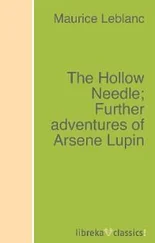Maurice Leblanc - The Tremendous Event
Здесь есть возможность читать онлайн «Maurice Leblanc - The Tremendous Event» — ознакомительный отрывок электронной книги совершенно бесплатно, а после прочтения отрывка купить полную версию. В некоторых случаях можно слушать аудио, скачать через торрент в формате fb2 и присутствует краткое содержание. Жанр: foreign_prose, на английском языке. Описание произведения, (предисловие) а так же отзывы посетителей доступны на портале библиотеки ЛибКат.
- Название:The Tremendous Event
- Автор:
- Жанр:
- Год:неизвестен
- ISBN:нет данных
- Рейтинг книги:3 / 5. Голосов: 1
-
Избранное:Добавить в избранное
- Отзывы:
-
Ваша оценка:
- 60
- 1
- 2
- 3
- 4
- 5
The Tremendous Event: краткое содержание, описание и аннотация
Предлагаем к чтению аннотацию, описание, краткое содержание или предисловие (зависит от того, что написал сам автор книги «The Tremendous Event»). Если вы не нашли необходимую информацию о книге — напишите в комментариях, мы постараемся отыскать её.
The Tremendous Event — читать онлайн ознакомительный отрывок
Ниже представлен текст книги, разбитый по страницам. Система сохранения места последней прочитанной страницы, позволяет с удобством читать онлайн бесплатно книгу «The Tremendous Event», без необходимости каждый раз заново искать на чём Вы остановились. Поставьте закладку, и сможете в любой момент перейти на страницу, на которой закончили чтение.
Интервал:
Закладка:
Disconcerted, Simon asked for explanations. There seemed to be none to give, except that one of the waiters said that the young lady had joined a sailor who seemed to be waiting for her in the street and that they had gone off together.
Taking the letter, Simon moved away with the intention of going to a café or entering the hotel, but he had not the courage to wait and it was by the light of a street lamp that he opened the envelope and read:
"I am writing to you with absolute confidence, feeling happy in the certainty that everything I say will be understood and that you will feel neither bitterness nor resentment, nor, after the first painful shock, any real distress.
"Simon, we have made a mistake. It is right that our love, the great and sincere love which we bear each other, should dominate all our thoughts and form the object of our whole lives, but it is not right that this love should be our only rule of conduct and our only obligation. In leaving England we did what is only permissible to those whose fate has persistently thwarted all their dreams and destroyed all their sources of joy. It was an act of liberation and revolt, which people have a right to perform when there is no other alternative than death. But is this the case with us, Simon? What have we done to deserve happiness? What ordeals have we suffered? What efforts have we made? What tears have we shed?
"I have done a great deal of thinking, Simon. I have been thinking of all those poor people who are dead and gone and whose memory will always make me shudder. I have thought of you and myself and my mother. Her too I saw die. You remember: we were speaking of her and of the pearls which she gave me when dying. They are lost; and that distresses me so terribly!
"Simon, I don't want to consider this and still less all the horrors of this awful day as warnings intended for us two. But I do want them to help us to look at life in a different way, to help us put up a prouder and pluckier fight against the obstacles in our path. The fact that you and I are alive while so many others are dead forbids us to suffer in ourselves any sort of weakness, untruth or shuffling, anything that cannot face the broad light of day.
"Win me, Simon. For my part, I shall deserve you by confidence and steadfastness. If we are worthy of each other, we shall succeed and we shall not need to blush for a happiness for which we should now have to pay – as I have felt many times to-day – too high a price of humiliation and shame.
"You will not try to find me, will you, Simon?
"Your promised wife,
"Isabel."
For a few moments Simon stood dumbfounded. As Isabel had foreseen, the first shock was infinitely painful. His mind was full of conflicting ideas which eluded his grasp. He did not attempt to understand nor did he ask himself whether he approved of Isabel's action. He suffered as he had never known that it was possible to suffer.
And suddenly, in the disorder of his mind, among the incoherent suppositions which occurred to him, there flashed a horrible thought. It was obvious that Isabel, determined to submit to her father before the scandal of her flight was noised abroad, had conceived the intention of returning to Lord Bakefield. But how would she put her plan into execution? And Simon remembered that Isabel had left the hotel in the most singular fashion, abruptly, on foot and accompanied by a sailor carrying her bag. Now the landing-stage of the Newhaven steamers was close to the hotel; and the night-boat would cast off her moorings in an hour or two.
"Can she be thinking of crossing?" he muttered, shuddering as he remembered the upheavals of the sea and the wreck of the Queen Mary .
He rushed towards the quay. Despite Isabel's expressed wish, he intended to see her; and, if she resisted his love, he would at least implore her to abandon the risk of an immediate crossing.
Directly he reached the quay, he perceived the funnels of the Newhaven steamer behind the harbour railway-station. Isabel, without a doubt, was there, in one of the cabins. There were a good many people about the station and a great deal of piled-up luggage. Simon made for the gangway, but was stopped by an official on duty:
"I have no ticket," said Simon. "I am looking for a lady who has gone on board and who is crossing to-night."
"There are no passengers on board," said the official.
"Really? How's that?"
"The boat is not crossing. There have been orders from Paris. All navigation is suspended."
"Ah!" said Simon Dubosc, with a start of relief. "Navigation is suspended!"
"Yes; that is to say, as far as the line's concerned."
"What do you mean, the line?"
"Why, the company only troubles about its own boats. If others care to put to sea, that is their look-out; we can't prevent them."
"But," said Simon, beginning to feel uneasy, "I suppose none has ventured to sail just lately?"
"Yes, there was one, about an hour ago."
"Oh? Did you see her?"
"Yes, she was a yacht, belonging to an Englishman."
"Edward Rolleston, perhaps?" cried Simon, more or less at a venture.
"Yes, I believe it was… Rolleston. Yes, yes, that's it: an Englishmen who had just put his yacht in commission."
Simon suddenly realized the truth. Rolleston, who was staying at Dieppe, happened to hear of Isabel's arrival, called at her hotel and, at her request, gave orders to sail. Of course, he was the only man capable of risking the adventure and of bribing his crew with a lavish distribution of bank-notes.
The young Englishman's behaviour gave proof of such courage and devotion that Simon at once recovered his normal composure. Against Rolleston he felt neither anger nor resentment. He mastered his fears and determined to have confidence.
The clouds were gliding over the town, so low that their black shapes could be distinguished in the darkness of the night. He crossed the front and leant upon the balustrade which borders the Boulevard Maritime. Thence he could see the white foam of the heavy breakers on the distant sands and hear their vicious assault upon the rocks. Nevertheless, the expected storm was not yet unleashed. More terrible in its continual, nerve-racking menace, it seemed to be waiting for reinforcements and to be delaying its onslaught only to render it more impetuous.
"Isabel will have time to reach the other side," said Simon.
He was now quite calm, full of faith in the present and the future. In absolute agreement with Isabel, he approved of her departure; it caused him no suffering.
"Come," he thought, "it is time to act."
He now recognized the purpose in view of which he had been preparing for years and years: it was to win a woman who was dearer to him than anything on earth and whose conquest would force him to claim that place in the world which his merits deserved.
He had done with hoarding. His duty was to spend, ay, to squander, like a prodigal scattering gold by the handful, without fear of ever exhausting his treasure.
"The time has come," he repeated. "If I am good for anything, I must prove it. If I was right to wait and husband my resources, I must prove it."
He began to walk along the boulevard, his head erect, his chest expanded, striking the ground with a ringing step.
The wind was rising to a gale. Furious showers swept the air. These were trifles to a Simon Dubosc, whose body, clad at all times of the year in light materials, took no heed of the rough weather and, even at the end of a day marked by so many trials, did not betray the slightest symptom of fatigue.
In truth, he felt inaccessible to ordinary weaknesses. His muscles were capable of unlimited endurance. His arms, his legs, his chest, his whole body, patiently exercised, were able to sustain the most violent and persistent efforts. Through his eyes, ears and nostrils he participated acutely in every vibration of the outer world. He was without a flaw. His nerves were perfectly steady. His will responded to every demand. He had the faculty of making up his mind at the first warning. His senses were always on the alert, but were controlled by his reason. He had keen intelligence and a clear, logical mind. He was ready.
Читать дальшеИнтервал:
Закладка:
Похожие книги на «The Tremendous Event»
Представляем Вашему вниманию похожие книги на «The Tremendous Event» списком для выбора. Мы отобрали схожую по названию и смыслу литературу в надежде предоставить читателям больше вариантов отыскать новые, интересные, ещё непрочитанные произведения.
Обсуждение, отзывы о книге «The Tremendous Event» и просто собственные мнения читателей. Оставьте ваши комментарии, напишите, что Вы думаете о произведении, его смысле или главных героях. Укажите что конкретно понравилось, а что нет, и почему Вы так считаете.












